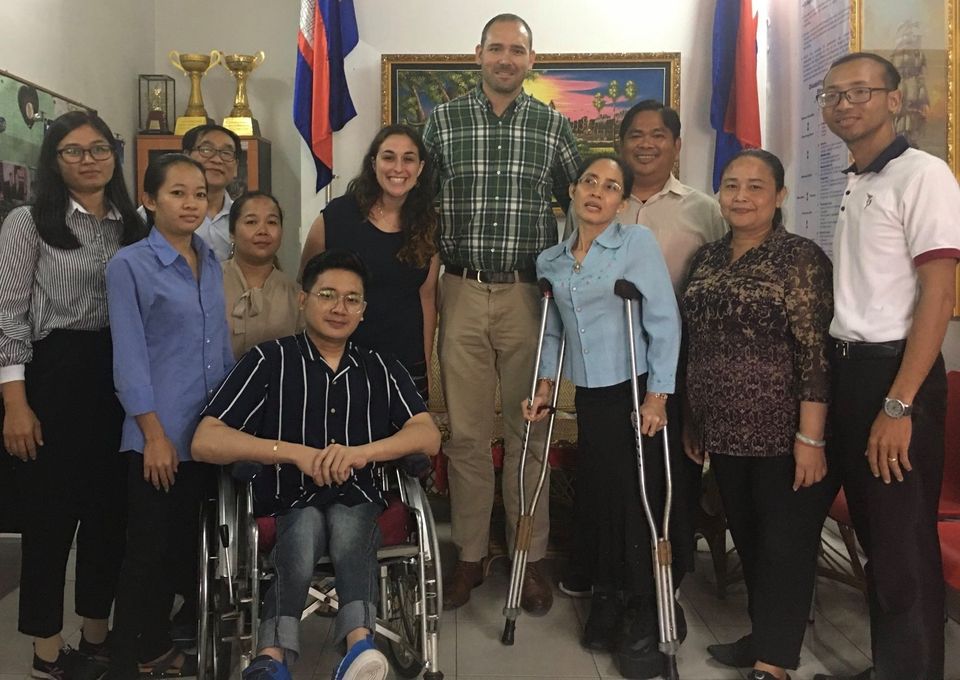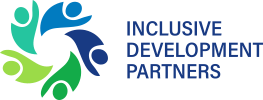Connecting the (Inclusive) Dots in Cambodia

Brent C. Elder, PhD, Sophak Kanika Nguon, and Hayley Niad
An American professor, a Cambodian lecturer/self-advocate with a disability, and an American project manager/doctoral student huddle together in a tuk-tuk for a week’s worth of meetings. This sounds like the opening line of a well-known “bar joke” in America. But, it is really the start of a really great collaborative project that spans Cambodia, Malawi, and Nepal.
As researchers and advocates for inclusive education, we make IDP’s Cambodia research team. Together, we are working in collaboration with Purdue University to evaluate the United States Agency for International Development’s (USAID) multi-country study on inclusive education (MCSIE). Our trip to Cambodia began the first major effort by USAID to investigate what works to improve the quality of education for learners with disabilities.
Cambodia finds itself in the position of actively advancing its efforts on inclusive education, and we were eager to observe this more closely during our trip. With net enrollment ratios for primary education 90% in 2018, access to basic education is relatively strong. However, there remain considerable challenges in access to an inclusive education for children with disabilities, and once in school, issues of equity, quality, and inclusion persist. In a landscape filled with international donors, non-government organizations, and government stakeholders providing inputs and developing projects to advance inclusion, there remains little coordination between stakeholders, and limited preparedness from teachers to accommodate the diverse needs of students in their classroom (Hayes & Bulat, 2018).
Of all three of the project countries, Cambodia was the first to begin. Our week-long “inception trip” was packed full of meeting with the many project stakeholders. Each morning our day started with cramming into a tuk-tuk and weaving through the traffic and sights of Phnom Penh. Surprisingly calm for a Southeast Asian capital, we caught glimpses of the mighty Mekong River, the Independence Monument, the stunning architecture of the National Museum and Royal Place, and the seemingly endless stalls and walls of Phsar Thmei (Central Market) on our daily commute.
Over the course of our week in Cambodia, the three of us played connect-the-dots between meetings with various partners implementing various aspects related to inclusive education in Cambodia. This involved detailed discussions with USAID and project stakeholders like Research Triangle Institute (RTI) International, and government collaborators including the Primary Education Department (PED) and Special Education Department (SED). We were pleased to learn of the rapid development of the National Institute of Special Education (NISE), which will serve as important hub and resource for national improvement in special education. Meeting with UNICEF, Cambodia and Deaf Development Programme (DDP), for example, also helped us to conceptualize the numerous inputs and investments into special and inclusive education across the country. We even spent a full day planning how to implement our research country-wide with the support of the very knowledgeable and supportive Cambodian Disabled People’s Organisation (CDPO). Put simply, it was a busy week, and we were thrilled to engage with so many passionate, motivated individuals working on the cause of inclusive education in Cambodia.
While we are clearly still wrapping our minds around all of the roles that each of the partners play in the inclusive education landscape of Cambodia, we know there is a lot of interest in making sure that inclusive education and disability rights are not simply an “add-on” to other projects currently underway. There is a strong desire to make inclusive education an integrated part of all the work being done, as disability intersects with all aspects of development programs (and the human condition). The big question remains “how” to do this in a way that honors the local disability community, their families, and all of the numerous partners involved. Further still, how can these efforts be meaningfully sustained?
In the coming months, we are excited to begin gathering research evidence to better frame the work on inclusive education in Cambodia. Stakeholders clearly expressed a deep commitment to figure out how to do this, moving beyond if we should. As the Malawi and Nepal projects get underway, within our country research teams, we will be sharing the aspects of each country context that we feel may be useful to others engaged in this work. Our hope is that we can conduct an evaluation of these three countries and provide recommendations that not only speak to each of these three country contexts, but also be applicable to other countries who are similarly invested in inclusive education and disability rights.
About the authors: We are a group of three researchers working to evaluate USAID’s inclusive education programming in Cambodia. Dr. Brent Elder is an assistant professor in the Interdisciplinary and Inclusive Education Department at Rowan University in New Jersey, USA, and founding member of the disability rights NGO, Tangata Group. Sophak Kanika Nguon plays different roles as self-advocate on disability rights, a lecturer at the Royal University of Phnom Penh, Department of Social Work, and works as consultant in disability sector. Hayley Niad is a program manager and researcher for Inclusive Development Partners (IDP), and a PhD student focusing on issues of inclusive education.
